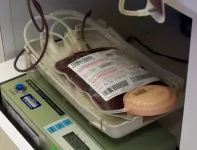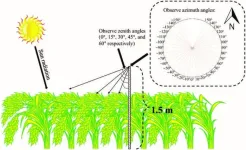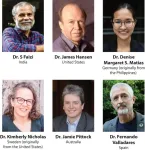(Press-News.org) About The Study: In this randomized clinical trial of 345 patients with mild-to-moderate COVID-19, viral load rebound and symptom rebound were both common after a standard 5-day course of antiviral treatment with either VV116 or nirmatrelvir-ritonavir. Prolongation of treatment duration might be investigated to reduce COVID-19 rebound.
Authors: Yufang Bi, M.D., and Yiping Xu, M.Sc., of the Shanghai Jiao Tong University School of Medicine in Shanghai, China, are the corresponding authors.
To access the embargoed study: Visit our For The Media website at this link https://media.jamanetwork.com/
(doi:10.1001/jamanetworkopen.2024.1765)
Editor’s Note: Please see the article for additional information, including other authors, author contributions and affiliations, conflict of interest and financial disclosures, and funding and support.
# # #
Embed this link to provide your readers free access to the full-text article This link will be live at the embargo time http://jamanetwork.com/journals/jamanetworkopen/fullarticle/10.1001/jamanetworkopen.2024.1765?utm_source=For_The_Media&utm_medium=referral&utm_campaign=ftm_links&utm_term=031324
About JAMA Network Open: JAMA Network Open is an online-only open access general medical journal from the JAMA Network. On weekdays, the journal publishes peer-reviewed clinical research and commentary in more than 40 medical and health subject areas. Every article is free online from the day of publication.
END
COVID-19 rebound after VV116 vs nirmatrelvir-ritonavir treatment
JAMA Network Open
2024-03-13
ELSE PRESS RELEASES FROM THIS DATE:
Mental well-being among adversity-exposed adolescents during the pandemic
2024-03-13
About The Study: The findings of this study of 4,515 adolescents suggest that in-person schooling and several coping behaviors (caring for one’s body, exercising, and engaging in healthy behaviors) were associated with significantly higher positive affect and lower perceived stress during the COVID-19 pandemic among adolescents with high adverse childhood experiences (ACEs). Adolescents with high ACEs demonstrated especially greater mental health scores when they reported in-person schooling. Future studies should build on these findings to identify clinical and school-based mental health protective ...
Enhancing plant photochemistry analysis: a novel approach to chlorophyll a fluorescence measurement under environmental stress
2024-03-13
Chlorophyll a fluorescence (ChlF) has been a pivotal tool in understanding plant photochemistry, offering insights into the energy transfer processes within chloroplasts and the efficiency of Photosystem II (PSII). Researchers have relied on quantifying ChlF through specific measures such as F0, Fm, and Fv under various lighting conditions to assess photosynthetic activities. Nonetheless, the technique encounters obstacles owing to the intrinsic uncertainties in gauging the absolute magnitude of ChlF and the fluctuation in baseline levels affected by environmental conditions. This complicates the interpretation of ...
It’s in the blood: donor diets can trigger allergic reactions in blood recipients
2024-03-13
Allergic transfusion reactions (ATRs), a potentially life-threatening side effect of blood transfusions with unclear mechanisms, may be linked to food allergies in pediatric patients as per a recent study by scientists from Japan. They found that ATRs may be triggered by the presence of allergens in the donor’s blood, influenced by their pre-donation diet. These findings could pave the way for safer blood transfusions through the development of preventive measures and countermeasures for ATRs.
Blood transfusions are often life-saving procedures in various medical settings. They are required not only after severe blood loss ...
Melissa A. Kelly, MS, CGC receives the 2024 ACMG Foundation Carolyn Mills Lovell Genetic Counselor Award
2024-03-13
Melissa A. Kelly, MS, CGC is the recipient of the 2024 ACMG Foundation Carolyn Mills Lovell Genetic Counselor Award. Ms. Kelly received the Lovell award for her platform presentation at the 2024 ACMG Annual Clinical Genetics Meeting, “Integrating genomic medicine into healthcare: Experience disclosing >5,000 clinically relevant results within the Geisinger MyCode Community Health Initiative.”
Ms. Kelly said, “Thank you to the ACMG Foundation. I am humbled and honored to receive the Carolyn Mills Lovell Genetic Counselor Award. Throughout my career, I have seen many ways in which patients and their families interact with and are impacted ...
Rory James Tinker, MD receives the 2024 Richard King Award for Best Publication by a Trainee in Genetics in Medicine
2024-03-13
Rory James Tinker, MD is the recipient of the 2024 Richard King Trainee Award. This award was instituted by the ACMG Foundation for Genetic and Genomic Medicine to encourage American Board of Medical Genetics and Genomics (ABMGG), international equivalents, or genetic counseling trainees in their careers and to foster the publication of the highest quality research in Genetics in Medicine (GIM), an official journal of the ACMG.
Each year the editorial board reviews all articles published in GIM by ...
ACMG Foundation/Revvity 2024 Travel Award presented to Meena Sethuraman, BS
2024-03-13
Meena Sethuraman, BS is the 2024 recipient of the ACMG Foundation/Revvity Travel Award. Ms. Sethuraman was selected to receive the award for her platform presentation, "Characterizing pathogenicity of ACADVL variants in very long-chain acyl-CoA dehydrogenase deficiency.”
Meena Sethuraman is a third-year medical student in the Physician Scientist Training Program at the University of Pittsburgh School of Medicine. Her research, being conducted with Dr. Jerry Vockley, FACMG, involves studying genetic variants in fatty acid oxidation disorders. Meena previously received her BS in Neurobiology at the University of Washington. Her undergraduate and post-baccalaureate ...
The ACMG Foundation for Genetic and Genomic Medicine presents seven Next Generation fellowship awards at the 2024 ACMG Annual Clinical Genetics Meeting
2024-03-13
Each year, the ACMG Foundation for Genetic and Genomic Medicine grants its Next Generation fellowship awards to promising early career professionals in a range of medical genetics and genomics specialties including Clinical Biochemical Genetics Laboratory, Laboratory Genetics and Genomics, Medical Biochemical and Ophthalmic Genetics. Support for this year’s class of Fellows was generously provided by Pfizer, Sanofi, Spark Therapeutics, Bionano and Horizon Therapeutics. The ACMG Foundation depends on corporate ...
Enhancing crop productivity analysis: a novel approach using SIF and PRI for accurate GPP estimation in rice canopies
2024-03-13
Solar-induced chlorophyll fluorescence (SIF) and the photochemical reflectance index (PRI) have emerged as significant tools in assessing the photosynthetic and carbon sequestration capacities of terrestrial vegetation, particularly for estimating gross primary productivity (GPP). However, the relationship between SIF, PRI, and GPP encounters challenges due to large temporal and spatial variabilities as well as the influence of various observational factors such as canopy structure and physiological state. Despite the potential of multi-angle observations and the Bidirectional Reflectance Distribution Function (BRDF) model to mitigate these ...
The Alliance of World Scientists announces 2024 Planet Earth Award laureates
2024-03-13
Corvallis, OR — The Alliance of World Scientists (AWS) is pleased to announce the six recipients of the 2024 Planet Earth Award: Dr. S Faizi, Dr. James Hansen, Dr. Denise Margaret S. Matias, Dr. Kimberly Nicholas, Dr. Jamie Pittock, and Dr. Fernando Valladares.
Planet Earth Award
The AWS Planet Earth Award acknowledges individuals who champion life on Earth. These individuals demonstrate exceptional creativity or contributions in their work in science-based advocacy with the public, ...
Staying in the loop: how superconductors are helping computers “remember”
2024-03-13
Computers work in digits — 0s and 1s to be exact. Their calculations are digital; their processes are digital; even their memories are digital. All of which requires extraordinary power resources. As we look to the next evolution of computing and developing neuromorphic or “brain like” computing, those power requirements are unfeasible.
To advance neuromorphic computing, some researchers are looking at analog improvements. In other words, not just advancing software, but advancing hardware too. Research from the University of California San Diego and UC Riverside shows a promising new way to store and transmit information ...
LAST 30 PRESS RELEASES:
New ‘scimitar-crested’ Spinosaurus species discovered in the central Sahara
“Cyborg” pancreatic organoids can monitor the maturation of islet cells
Technique to extract concepts from AI models can help steer and monitor model outputs
Study clarifies the cancer genome in domestic cats
Crested Spinosaurus fossil was aquatic, but lived 1,000 kilometers from the Tethys Sea
MULTI-evolve: Rapid evolution of complex multi-mutant proteins
A new method to steer AI output uncovers vulnerabilities and potential improvements
Why some objects in space look like snowmen
Flickering glacial climate may have shaped early human evolution
First AHA/ACC acute pulmonary embolism guideline: prompt diagnosis and treatment are key
Could “cyborg” transplants replace pancreatic tissue damaged by diabetes?
Hearing a molecule’s solo performance
Justice after trauma? Race, red tape keep sexual assault victims from compensation
Columbia researchers awarded ARPA-H funding to speed diagnosis of lymphatic disorders
James R. Downing, MD, to step down as president and CEO of St. Jude Children’s Research Hospital in late 2026
A remote-controlled CAR-T for safer immunotherapy
UT College of Veterinary Medicine dean elected Fellow of the American Academy of Microbiology
AERA selects 34 exemplary scholars as 2026 Fellows
Similar kinases play distinct roles in the brain
New research takes first step toward advance warnings of space weather
Scientists unlock a massive new ‘color palette’ for biomedical research by synthesizing non-natural amino acids
Brain cells drive endurance gains after exercise
Same-day hospital discharge is safe in selected patients after TAVI
Why do people living at high altitudes have better glucose control? The answer was in plain sight
Red blood cells soak up sugar at high altitude, protecting against diabetes
A new electrolyte points to stronger, safer batteries
Environment: Atmospheric pollution directly linked to rocket re-entry
Targeted radiation therapy improves quality of life outcomes for patients with multiple brain metastases
Cardiovascular events in women with prior cervical high-grade squamous intraepithelial lesion
Transplantation and employment earnings in kidney transplant recipients
[Press-News.org] COVID-19 rebound after VV116 vs nirmatrelvir-ritonavir treatmentJAMA Network Open



